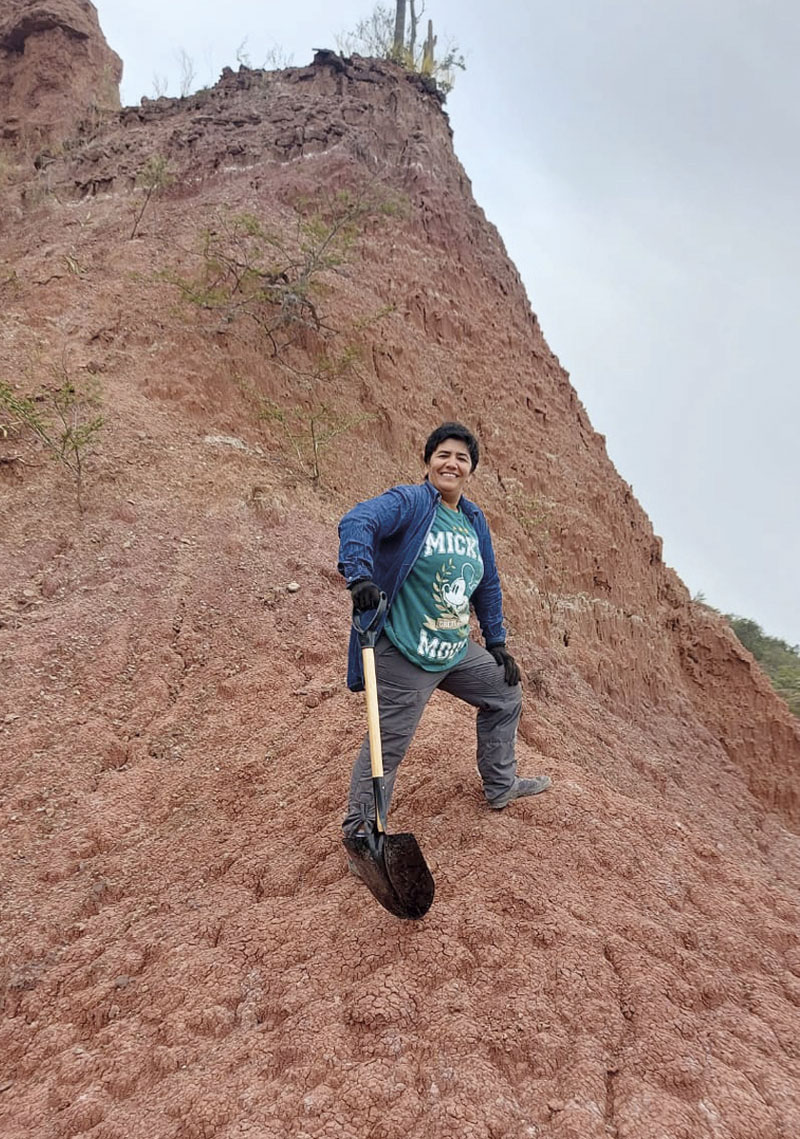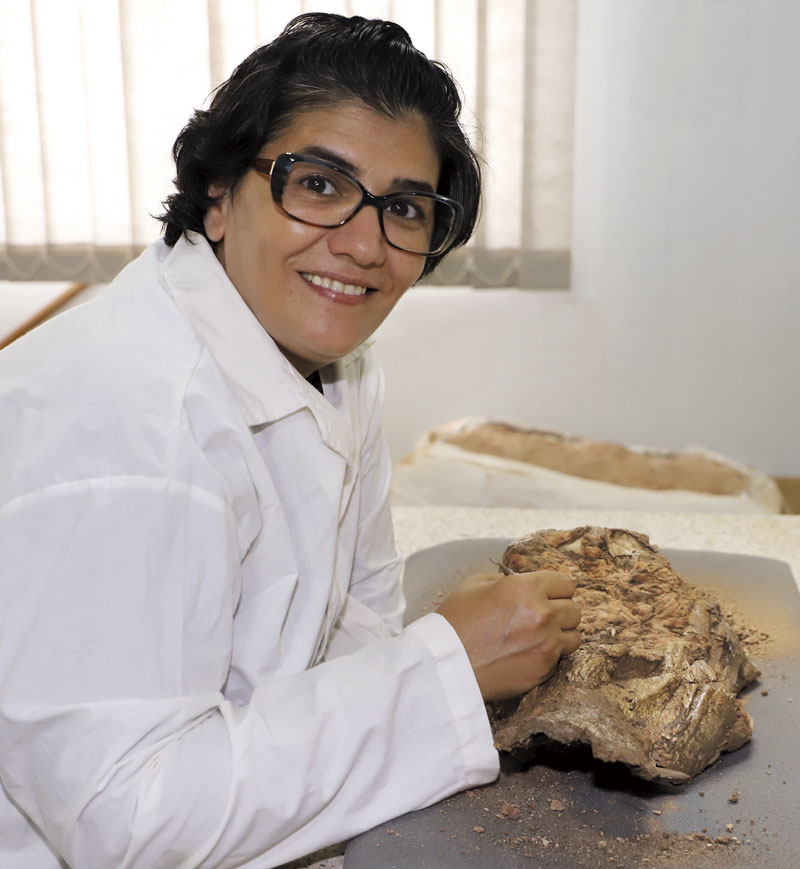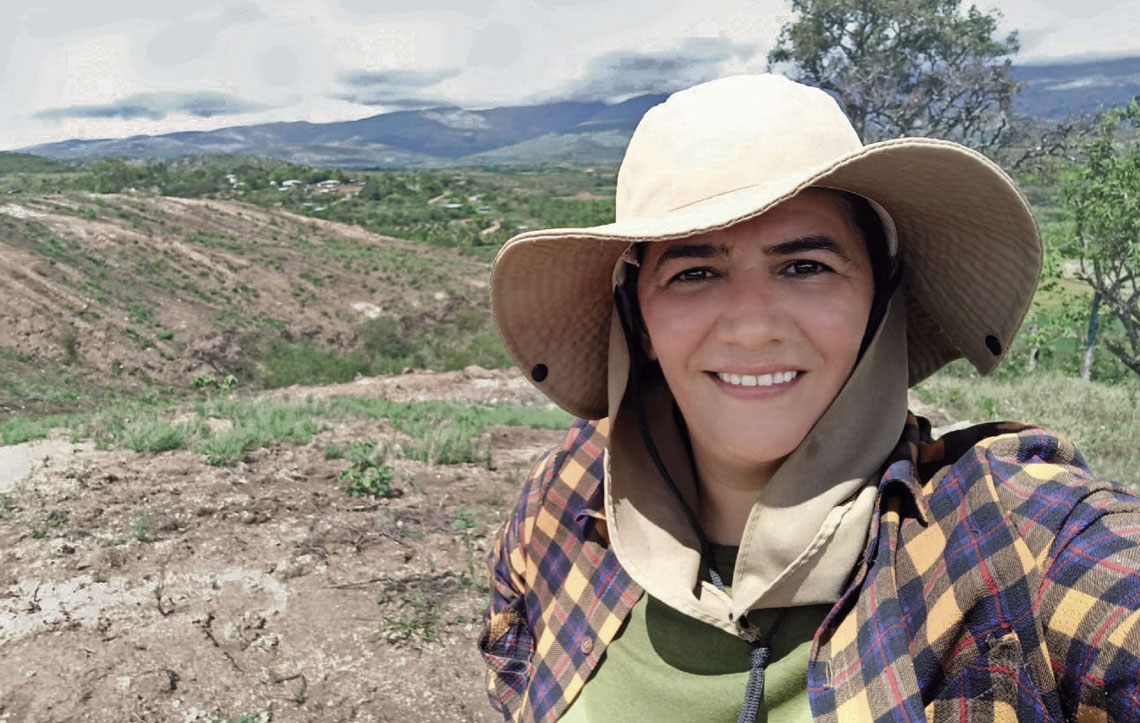I was born in Damascus, Syria, the oldest capital city in the world. I have always liked animals and plants, and when it came to deciding what to study, biology was a logical choice for me. I graduated from Damascus University in 2004 and began teaching plant taxonomy there soon after. To top up my family’s income, I also worked in the administrative department of a company. I have five siblings and I have always contributed to the household expenses.
Next, I did a master’s degree in environmental studies as part of a collaborative program between Damascus University and the University of Poitiers in France. This course opened the door for me to work as an environmental impact consultant on major projects, such as oil exploration and civil construction. I traveled across Syria and to other Arab countries for my work, including to Saudi Arabia, which was something unusual for a single woman in my country’s culture.
In 2008, while I was doing fieldwork in Syria, an archaeologist on the same team introduced me to paleontology. I say introduced because despite the study of animal and plant fossils being a common field for biologists, I only took one or two paleontology classes as an undergraduate. My colleague’s explanation captivated me, and I decided that was what I wanted to do with my life.

Personal archiveWafa at the doing fieldwork in Peru in 2023Personal archive
In 2010 and 2011, I wrote a research proposal to study insects preserved in amber. But in the midst of this process, the civil war in Syria began, putting my dream of studying paleontology on hold. Because of the conflict, I had to leave the country to continue earning an income, so I went to Lebanon. It was a very difficult time, during which my only focus was working so that I could help my family in Syria financially.
At the turn of 2016, two events contributed to my decision to move to Brazil. The first was that I was denied permission to stay in Lebanon, and the second, much more difficult, was the death of my father. I was very close to him and found it hard to deal with his absence from our home. I needed some time.
The civil war continued. That was when I found out that Brazil was accepting refugees, so I decided to apply for a visa. It was issued within just seven days. I still had this dream of studying paleontology, so before moving, I searched online for researchers in this field and found the Paleontology Laboratory at the University of São Paulo [USP], Ribeirão Preto campus, headed by Professor Max Langer. I wrote to him in English, telling him that I wanted to study insects and plants preserved in amber.
He replied the very same day, saying that I would be welcome at his lab, and that he could also recommend me to other researchers working with amber, since that was not his specialty. In August 2016, at the age of 36, I left my country for Brazil, with anticipation and courage, without a scholarship and with only my savings to survive on. I never imagined that my research career, in such a far away and culturally different country, would one day end up taking me back to Syria.
I started working in the lab, preparing fossils while I tried to decide on a research topic to pursue for my PhD. I knew that if I chose to study insects and plants preserved in amber, it would have to be somewhere else in Brazil. And I did not want that. After everything I had been through — the war, my father’s death, the interruption of my research, moving to a new country — I was very emotionally fragile.
I had been so warmly welcomed by Professor Langer and his team that I decided to stay in Ribeirão Preto, and I started working with vertebrates from the so-called Bauru Group. The Bauru basin has one of the richest arrays of vertebrate fossils in Brazil and the largest in the state of São Paulo.
In 2017, Professor Langer suggested that I do a review of the phylogenetic characters from studies on the first dinosaurs as my doctoral research. In biology, phylogenetics is the study of evolutionary history and genetic relationships between groups of organisms. I had never studied dinosaurs, but I started working on the project anyway. My proposal was approved at the end of that year as part of the PhD Program in Comparative Biology at the USP campus in Ribeirão Preto, almost 10 years after I first ventured into this field when I was still in Syria.

Alexandre FernandesWafa at the USP Paleontology Laboratory in Ribeirão PretoAlexandre Fernandes
There is no consensus on the phylogenetic relationships between the first dinosaurs, with various different theories on their origins. For my PhD, I evaluated the quality of the phylogenetic characters used to study the emergence of these animals. Over the course of my research, I created an extensive list of almost 7,000 phylogenetic characters, which describe the morphology of the first dinosaurs.
I completed my PhD in 2021 after overcoming many challenges. In addition to the language barrier and the COVID-19 pandemic, I also had a medical issue that was suspected to be breast cancer, which fortunately was later ruled out. For all of these reasons, I am immensely proud of my work.
My research on vertebrates also opened the possibility of returning to Syria to study fossils from my homeland, something I had wanted to do since I first chose to pursue paleontology. In 2022, I helped identify a set of fossils of a large marine reptile found in a mine in the center of the country. It was a plesiosaur, from a group of animals that inhabited the oceans in the Cretaceous period and went extinct 66 million years ago.
The fossils were collected in 2010 and had been in storage ever since. Because of the war, foreign researchers never went there to examine the findings, and there were no vertebrate fossil experts in Syria back then. I am the first. To identify the fossils, I spent almost a month in Damascus collecting data, which was analyzed at the USP lab in Ribeirão Preto.
After I published the results earlier this year, I went back to Syria again in April to give a lecture at Damascus University and to do interviews for several television networks. While I was there, I also began a new series of studies of other fossil sets, including a mosasaur and a pterosaur.
I am now a Brazilian — I was granted citizenship two years ago. But I am also a proud Syrian, and it makes me happy to contribute to my home country through my research. My heart is permanently divided. I miss my mother, my brothers, and my language, but Brazil is my home now. I have created a family here, with many friends and my three cats: Azeitona, Coxinha, and Jabuticaba.
Republish